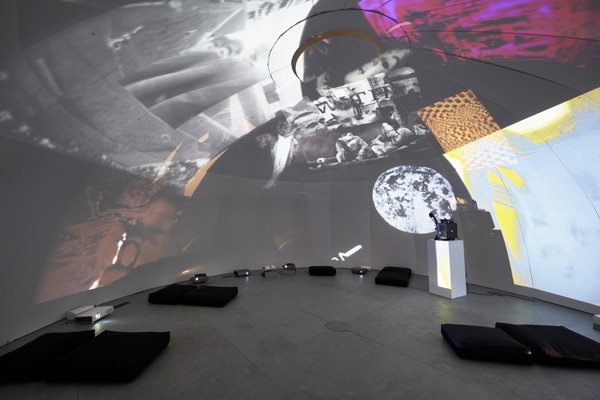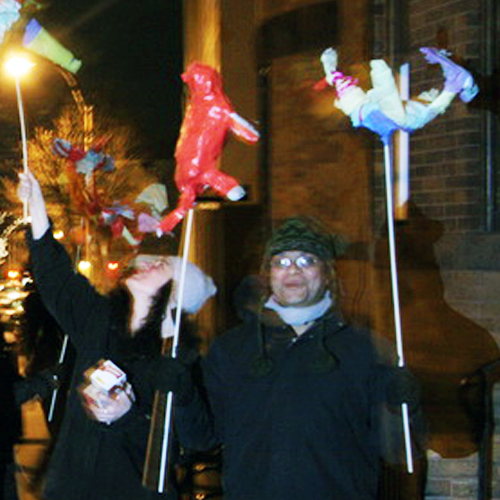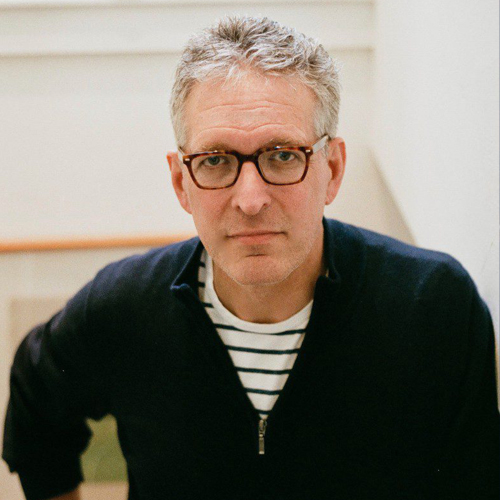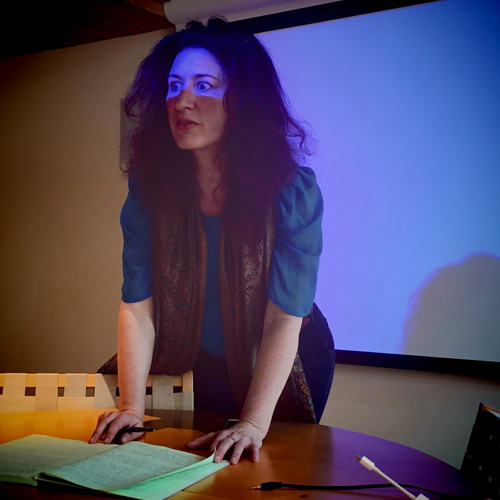
Stan VanDerBeek, Movie-Drome, 1963—66/2012. Courtesy the Estate of Stan VanDerBeek
Ghosts & Machines: Science and Technology in Spiritual Practice
Vision Lab in residence at Center for the Study of World Religions, Harvard Divinity School
Cambridge, MA, 2018
Cambridge, MA, 2018
Here are a few of many questions we'll provoke together at our next VISION LAB workshop Ghosts & Machines: Technology and Spirituality this Wednesday from 6-8pm at the Center for the Study of World Religions at Harvard Divinity School, 42 Francis Ave., Cambridge. If you'd like to attend and haven't already, please send me an email to RSVP.
![]()
Kranzberg's first law of technology says: "Technology is neither good nor bad; nor is it neutral."
1) Have the digital technologies of the last several decades had a bias or leaning vis-a-vis spiritual life? 2) Can technology grow or evolve in a spiritual direction?
We're thrilled to present interactive talks, conversations, and provocations with (quite probably! stay tuned ...): Williams Powers (MIT Media Lab), Aden Von Noppen (Harvard Divinity School), Ganavya Doraiswamy (Harvard FAS, Department of Music), Umang Kumar (Harvard Divinity School Alumni and Software Engineer)
RSVP to kytheheller@gmail.com. Wednesday, April 18, 6-8pm, kindly hosted by the Center for the Study of World Religions at Harvard Divinity School, 42 Francis Ave. Cambridge.
Vision Lab is an experimental lab in the Future of Religion, in residence at the CSWR during spring 2018. How do we invite a reality into being that we have never seen before—a reality that counters the no longer merely threatened destruction of our social contract and collective planetary future? To what extent can we challenge each other to flex our visioning and
dreaming skills and act in accordance with our “exalted frequencies” (Glissant) so that these frequencies come to directly constitute reality? This set of six open public workshop sessions invites the visionary-minded artists, activists, tech creatives, poets, intellectuals, mystics, rebels, and revolutionary thinkers from various Harvard Schools and MIT and the larger Boston arts community to think and create new work and ideas together. In what ways might we create sites of evolution, sites of resistance, parts of an array of realizing new technological, social, and ecological relationships by considering how to use spirituality, technology, language, art, and activism to radically change our ways of being in the world?
Sponsor: Center for the Study of World Religions. Harvard Divinity School.
RSVP Kythe Heller: kytheheller@gmail.com. Wednesday, April 18, 2018, 6:00 PM – 8:00 PM. CSWR Conference Room, 42 Francis Ave., Cam
Kranzberg's first law of technology says: "Technology is neither good nor bad; nor is it neutral."
1) Have the digital technologies of the last several decades had a bias or leaning vis-a-vis spiritual life? 2) Can technology grow or evolve in a spiritual direction?
We're thrilled to present interactive talks, conversations, and provocations with (quite probably! stay tuned ...): Williams Powers (MIT Media Lab), Aden Von Noppen (Harvard Divinity School), Ganavya Doraiswamy (Harvard FAS, Department of Music), Umang Kumar (Harvard Divinity School Alumni and Software Engineer)
RSVP to kytheheller@gmail.com. Wednesday, April 18, 6-8pm, kindly hosted by the Center for the Study of World Religions at Harvard Divinity School, 42 Francis Ave. Cambridge.
Vision Lab is an experimental lab in the Future of Religion, in residence at the CSWR during spring 2018. How do we invite a reality into being that we have never seen before—a reality that counters the no longer merely threatened destruction of our social contract and collective planetary future? To what extent can we challenge each other to flex our visioning and
dreaming skills and act in accordance with our “exalted frequencies” (Glissant) so that these frequencies come to directly constitute reality? This set of six open public workshop sessions invites the visionary-minded artists, activists, tech creatives, poets, intellectuals, mystics, rebels, and revolutionary thinkers from various Harvard Schools and MIT and the larger Boston arts community to think and create new work and ideas together. In what ways might we create sites of evolution, sites of resistance, parts of an array of realizing new technological, social, and ecological relationships by considering how to use spirituality, technology, language, art, and activism to radically change our ways of being in the world?
Sponsor: Center for the Study of World Religions. Harvard Divinity School.
RSVP Kythe Heller: kytheheller@gmail.com. Wednesday, April 18, 2018, 6:00 PM – 8:00 PM. CSWR Conference Room, 42 Francis Ave., Cam

Aden Van Noppen is the Founder and Executive Director of Mobius, a collaboration between leading neuroscientists, meditation teachers and technologists to catalyze the creation of digital technology that enhances our individual and collective well-being. Before Mobius, she was the Resident Fellow at Harvard Divinity School focusing on the intersection of tech, ethics and spirituality. Aden was Senior Advisor to the U.S. Chief Technology Officer in the Obama Administration’s White House Office of Science and Technology Policy, where she developed the Local Innovation Portfolio and ran programs that apply tech as a tool for social and economic justice.

Umang Kumar: Harvard Divinity School graduate, activist & computer software engineer. Has been actively engaged with and closely observing social movements and thinking and researching various new forms of sociality & activism. How not to be siloed. How to be sustainable as an activist organization. “What does each one of us bring to the table in terms of our ideas of what social change is, what we want to accomplish, and how to do it?” Involved with issues of race, police brutality, indigenous populations, Palestine, Dalit issues and in general issues of belonging and learning.

Ganavya Iyer Doraiswamy (/ɡɑːnəvˌjɑː/; born July 21, 1991), known mononymously as Ganavya, is an American-born Indian vocalist, scholar and multi-disciplinary artist. She is the granddaughter of Carnatic music multi-instrumentalist Seetha Doraiswamy. “For you, I sing: to remind you of your ability to transform this world. You are divine light.” These are the opening words to Daughter of a Temple (2019), composed, written and sung by Ganavya. Tamil Nadu-raised and New York-born critically acclaimed vocalist Ganavya lives, learns, and loves fluidly from the nexus of many frameworks and understandings. Hers is a deeply profound and rooted voice. A multidisciplinary creator, she is a soundsmith and wordsmith. Trained as an improviser, scholar, dancer, and multi-instrumentalist, she maintains an inner library of “spi/ritual” blueprints offered to her by an intergenerational constellation of collaborators, continuously anchoring her practice in pasts, presents and futures.

William Powers is a writer, journalist and technologist. I spent a large part of my early career writing about media for major news outlets including The Washington Post. I wrote the book Hamlet’s BlackBerry: Building a Good Life in the Digital Age (HarperCollins, 2010), which offered constructive philosophical solutions to some of the human downsides of the digital age. A New York Times bestseller, it has been published in many countries and languages. I grew up in Rhode Island and graduated from Harvard with a degree in history and literature. I did graduate study in Spain, then moved to Washington, DC, where I was a U.S. Senate aide working on foreign relations, intelligence and military affairs. My writing has appeared in The Atlantic, The New York Times and many other publications. I’m a two-time winner of the National Press Club’s Rowse Award for media criticism. I have given keynote talks at conferences such as South by Southwest and the Aspen Ideas Festival, as well as numerous universities and other organizations. I’ve moderated conversations for the Aspen Institute’s Socrates program in the US and other countries.

Kythe Heller is a poet, artist, and doctoral student in Comparative Religion at Harvard University, with a secondary field in Critical Media Studies. She is author of the poetry collections Immolation and The Thunder Perfect Mind, and of critical studies published in White Light: Media, Culture, Politics (Cambridge UP) and Quo Anima: Innovation and Spirituality in Contemporary Poetry (U of Akron Press).